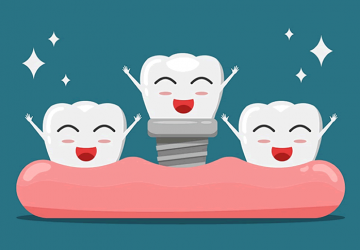Dental implants have revolutionized restorative dentistry, and technology enhances the procedure's success and patient comfort. Here's an in-depth guide on dental implants, their benefits, and the role of technology.

Understanding Dental Implants
Dental implants are titanium posts surgically placed into the jawbone to replace missing teeth. They serve as anchors for dental prostheses like crowns, bridges, and dentures, providing a stable and long-lasting solution.
Benefits of Dental Implants
Enhanced Appearance and Function
: Implants look and feel like natural teeth.Durability
: With proper care, dental implants can last a lifetime.Improved Oral Health
: Unlike traditional bridges, implants don’t require altering neighboring teeth.Bone Preservation
: Implants prevent bone loss and preserve jaw structure.The Role of Restorative Dentistry in Dental Implants
Restorative dentistry focuses on rehabilitating and replacing damaged or missing teeth. Dental implants are a core component of restorative treatments.
Steps in the Implant Process
Assessment and Planning
: Comprehensive oral exams, X-rays, and 3D imaging.Implant Placement
: Surgical placement of the implant into the jawbone.Osseointegration
: The healing period where the implant integrates with the bone.Abutment Placement
: A connector placed on the implant to hold the prosthesis.Prosthesis Attachment
: The final step involves attaching the custom-made crown or bridge.Leveraging Technology in Dental Implants
Technological advancements have significantly improved the precision, efficiency, and outcomes of dental implant procedures.
Innovations in Imaging
3D Dental Imaging
: Provides detailed views of the oral structure, aiding in accurate diagnosis and planning.Cone Beam Computed Tomography (CBCT)
: Offers high-resolution, 3D images to assess bone density and anatomy.Computer-Aided Design and Manufacturing (CAD/CAM)
Precision Design
: CAD/CAM technology allows for the custom design of implants and prostheses.Efficiency
: Streamlines the fabrication process, resulting in quicker turnarounds and enhanced fit.Tips for Successful Dental Implants
Choose an Experienced Prosthodontist
: Expertise in restorative dentistry increases the likelihood of successful implant integration.Maintain Good Oral Hygiene
: Clean the implant site meticulously to prevent infections.Follow Post-Surgery Instructions
: Adhering to your dentist’s guidelines ensures optimal healing.Regular Dental Visits
: Schedule frequent check-ups to monitor the health of your implants and adjacent teeth.Innovative Tools in Restorative Dentistry for Implants
Digital Impressions
: Eliminates the discomfort of traditional molds and provides accurate digital 3D images.Guided Implant Surgery
: Utilizes surgical guides created from digital models to enhance precision during implant placement.Overcoming Challenges with Technology
Bone Augmentation
: Advanced technology allows for effective bone grafting procedures if bone density is inadequate.Custom Prostheses
: Tailored to fit seamlessly with your natural dental structure, ensuring comfort and functionality.The Future of Dental Implants and Restorative Dentistry
Emerging technologies like tissue engineering and smart implants are set to further elevate the field.
Tissue Engineering
Regeneration
: Encourages the growth of new bone tissue around the implant, enhancing stability.Biocompatibility
: Reduces the risk of rejection and promotes natural integration.Smart Implants
Sensors and Data Transmission
: Monitors the implant's health and integration, sending data to the dentist for proactive care.Enhanced Longevity
: Increases the lifespan and reliability of dental implants.Conclusion
Embracing technology in dental implants and restorative dentistry not only optimizes treatment outcomes but also enhances patient experience. By understanding the process and leveraging advanced tools, you can ensure a successful and lasting dental solution. Whether you're considering implants or simply wish to stay informed, this guide provides a comprehensive overview of the pivotal role of technology in modern dentistry.
For more customized advice, consult with a qualified restorative dentist who can tailor the top treatment plan for your unique needs.









